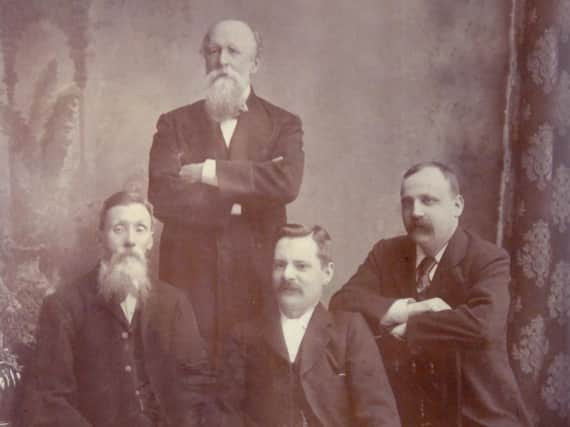How the Bronte Museum was very nearly based in Dewsbury


The new owners dispensed with the services of the paper’s long-standing editor, Mr William W Yates, who, aged 74, was probably deemed too old. Shame on them.
However, his enforced retirement allowed him to complete a book he had been writing for 20 years about Patrick Bronte entitled “Father of the Brontes”.
Advertisement
Hide AdAdvertisement
Hide AdPatrick, of course, was the father of the famous literary sisters, Charlotte, Emily, and Anne, who were educated in this district.
Charlotte was a scholar and teacher at Roe Head in Mirfield, and later, when it moved to Healds House in Dewsbury, was retained as a teacher there.
Emily and Anne joined her as scholars, but Emily didn’t stay long. Anne did and later became a governess for the Ingham family at Blake Hall, Mirfield.
Patrick spent only two years in Dewsbury, as curate at Dewsbury Parish Church, from 1809 to 1811, and later became Vicar of Hartshead Church.
Advertisement
Hide AdAdvertisement
Hide AdDuring his stay here, Patrick made a great impression on the people, especially the poor, and Mr Yates would do the same, some 60 years after him.
For Mr Yates took up his appointment with the Reporter in 1861, the same year as Patrick Bronte died.
And it was only after Mr Yates arrived here from Leicester that he discovered there was a Bronte connection with Dewsbury and district.
Being an astute journalist, he realised how important it was for the paper to trace and talk to those who had known Patrick before they too would pass away.
Advertisement
Hide AdAdvertisement
Hide AdHe interviewed anyone who had known the Bronte family and he quickly realised there was a great need for a society to be formed to safeguard all he had discovered.
He also saw the importance of finding somewhere to store all this history, along with the many Bronte artefacts which had been brought to his attention.
It was not long before he became instrumental in founding what is now the highly respected Bronte Society, and he arranged its first meeting in Dewsbury Town Hall.
He also played an important part in founding the Bronte Museum in Haworth, where Patrick had been vicar for more than 40 years.
Advertisement
Hide AdAdvertisement
Hide AdWhile I was doing my own research of the Bronte Society and the part Mr Yates played in it, I was surprised to discover that the Bronte Museum very nearly started life in Dewsbury.
For, when the newly formed Bronte Society was looking for somewhere to store their artefacts, the old Dewsbury Borough Council offered them Crow Nest Park.
But before the offer could be accepted, Haworth Parsonage was put at their disposal, and this is where the museum still stands today.
Looking back, if it hadn’t been for Mr Yates’ foresight, there might never have been a Bronte Society or a Bronte Museum.
Advertisement
Hide AdAdvertisement
Hide AdThis proves how important local papers can be in collating and safeguarding the social history of the towns they serve.
Local papers can also be credited with many improvements they have campaigned for over the years. So please continue buying yours.
Mr Yates lived in Vulcan Road, on the Flatts, within walking distance of his office, which in those days was at the top of Daisy Hill in Dewsbury.
He used his influence as editor to campaign against abuse and injustice and held a number of high positions in the community, including being a member of the town council.
Advertisement
Hide AdAdvertisement
Hide AdI wish to remember him this week, particularly as the Reporter is celebrating its 163rd anniversary this month.
For, such men as Mr Yates do have an important place in the history of our towns, and I’m glad that letters did appear in the paper decrying the new owners’ decision to sack him in 1897.
However, Mr Yates’ enforced retirement did give him the opportunity to complete the book he had been writing for 20 years – “Father of the Brontes”.
The book contains not only details of Patrick’s stay in Dewsbury but also details of what Dewsbury was like when he arrived here in 1809.
Advertisement
Hide AdAdvertisement
Hide AdI am fortunate to have a copy of this book, thanks to Imelda Marsden, of Mirfield, who is a long-standing member of the Bronte Society.
This book reminds us of Patrick Bronte’s deep sympathy with the working classes, who were in a grievous state of poverty, ill-fed and poorly clad, at the time.
Patrick, as Mr Yates points out in his book, never sought to cultivate the acquaintances of the wealthier people of Dewsbury. Instead, he spent most of his time visiting the poor in their humble cottages and holding prayer meetings there.
The same could be said about our Mr Yates, who, during his editorship of the Reporter, mixed with the poor, visited them in their homes, and also in the workhouses when they were sent there.
Advertisement
Hide AdAdvertisement
Hide AdHe ran powerful campaigns in the paper on how badly housed the poor were in Dewsbury, many in homes which would later be described as “hovels” not fit for human habitation.
Mr Yates died in 1918 and is buried in Dewsbury Minster Churchyard. Perhaps someone, some day, will write a book about him..